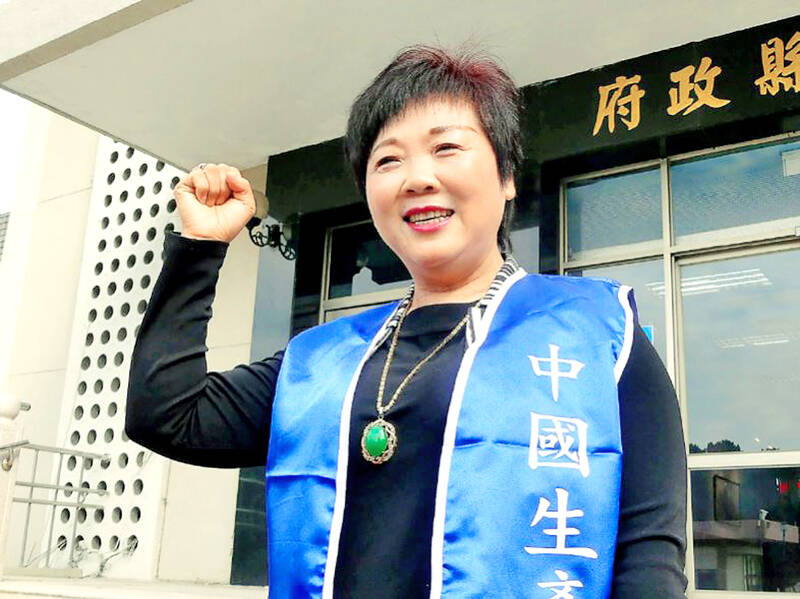Former China Production Party honorary chairperson Lu Yuexiang (盧月香) has reportedly accepted an official position in China and may be fined between NT$100,000 and NT$500,000 for contravening the Act Governing Relations Between the People of the Taiwan Area and the Mainland Area (臺灣地區與大陸地區人民關係條例).
Taiwanese are prohibited from holding any position or becoming members of any Chinese agencies, institutions or organizations that have political, military or administrative links to the Chinese government, Article 33 of the act says.
Lu, who is a native of China and holds Republic of China citizenship through marriage to a Taiwanese, is said to have taken up a position as a committee member of the Chinese People’s Political Consultative Conference (CPPCC) of Fujian Province.

Photo: Taipei Times
The Mainland Affairs Council said that it would ask local authorities to investigate the case, while the Ministry of the Interior said that it was in the process of understanding the issue and would mete out appropriate punishment according to the law.
The council urged Taiwanese to abide by the act and other regulations when engaging in cross-strait exchanges.
Lu came to Taiwan in 1992 after marrying a Taiwanese and became an ROC citizen in 2001, an official said.
She founded the Chinese Production Party in Taiwan in 2010.
However, its establishment was revoked as she had not had a household registration in Taiwan for at least 10 years, the official said.
Her husband later founded the China Production Party and she was named the honorary chairperson, the official said.
Lu would not be the first to be fined by the Taiwanese government for assuming an official post in China.
The Ministry of the Interior in March 2019 fined Ling Yu-shih (凌友詩), an ROC citizen, NT$500,000 for accepting an official position in China.
The ministry said at the time that Ling accepted a seat at the CPPCC as a representative of the China-Taiwan Association, a private organization established to “serve as a bridge and link between the ruling [Chinese Communist] party and government, and Taiwanese compatriots.”
Ling last month was quoted by Hong Kong’s Sing Tao Daily as saying that she was fined again by the ministry this year for accepting a position as a representative in China’s National People’s Congress.
She said she has not paid the two fines and would not pay them as doing so would be tantamount “to recognizing the Taiwanese authority and admitting fault” for taking up official posts in China.

DAREDEVIL: Honnold said it had always been a dream of his to climb Taipei 101, while a Netflix producer said the skyscraper was ‘a real icon of this country’ US climber Alex Honnold yesterday took on Taiwan’s tallest building, becoming the first person to scale Taipei 101 without a rope, harness or safety net. Hundreds of spectators gathered at the base of the 101-story skyscraper to watch Honnold, 40, embark on his daredevil feat, which was also broadcast live on Netflix. Dressed in a red T-shirt and yellow custom-made climbing shoes, Honnold swiftly moved up the southeast face of the glass and steel building. At one point, he stepped onto a platform midway up to wave down at fans and onlookers who were taking photos. People watching from inside

A Vietnamese migrant worker yesterday won NT$12 million (US$379,627) on a Lunar New Year scratch card in Kaohsiung as part of Taiwan Lottery Co’s (台灣彩券) “NT$12 Million Grand Fortune” (1200萬大吉利) game. The man was the first top-prize winner of the new game launched on Jan. 6 to mark the Lunar New Year. Three Vietnamese migrant workers visited a Taiwan Lottery shop on Xinyue Street in Kaohsiung’s Gangshan District (崗山), a store representative said. The player bought multiple tickets and, after winning nothing, held the final lottery ticket in one hand and rubbed the store’s statue of the Maitreya Buddha’s belly with the other,

‘NATO-PLUS’: ‘Our strategic partners in the Indo-Pacific are facing increasing aggression by the Chinese Communist Party,’ US Representative Rob Wittman said The US House of Representatives on Monday released its version of the Consolidated Appropriations Act, which includes US$1.15 billion to support security cooperation with Taiwan. The omnibus act, covering US$1.2 trillion of spending, allocates US$1 billion for the Taiwan Security Cooperation Initiative, as well as US$150 million for the replacement of defense articles and reimbursement of defense services provided to Taiwan. The fund allocations were based on the US National Defense Authorization Act for fiscal 2026 that was passed by the US Congress last month and authorized up to US$1 billion to the US Defense Security Cooperation Agency in support of the

‘COMMITTED TO DETERRENCE’: Washington would stand by its allies, but it can only help as much as countries help themselves, Raymond Greene said The US is committed to deterrence in the first island chain, but it should not bear the burden alone, as “freedom is not free,” American Institute in Taiwan Director Raymond Greene said in a speech at the Institute for National Defense and Security Research’s “Strengthening Resilience: Defense as the Engine of Development” seminar in Taipei yesterday. In the speech, titled “Investing Together and a Secure and Prosperous Future,” Greene highlighted the contributions of US President Donald Trump’s administration to Taiwan’s defense efforts, including the establishment of supply chains for drones and autonomous systems, offers of security assistance and the expansion of